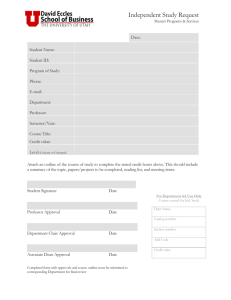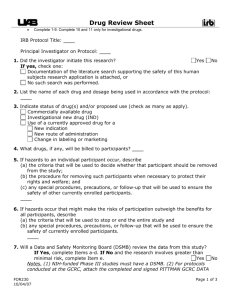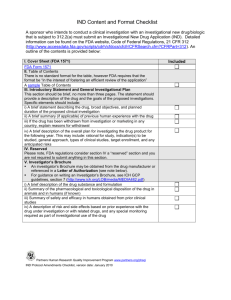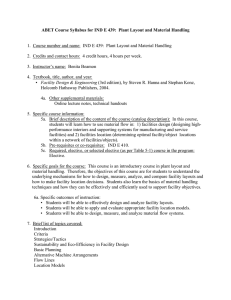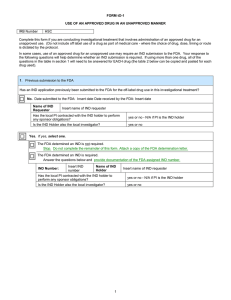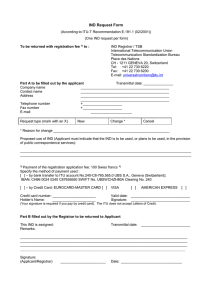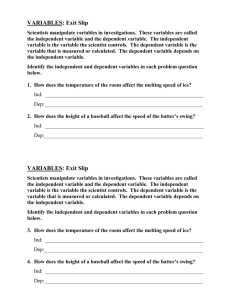Form tO
advertisement
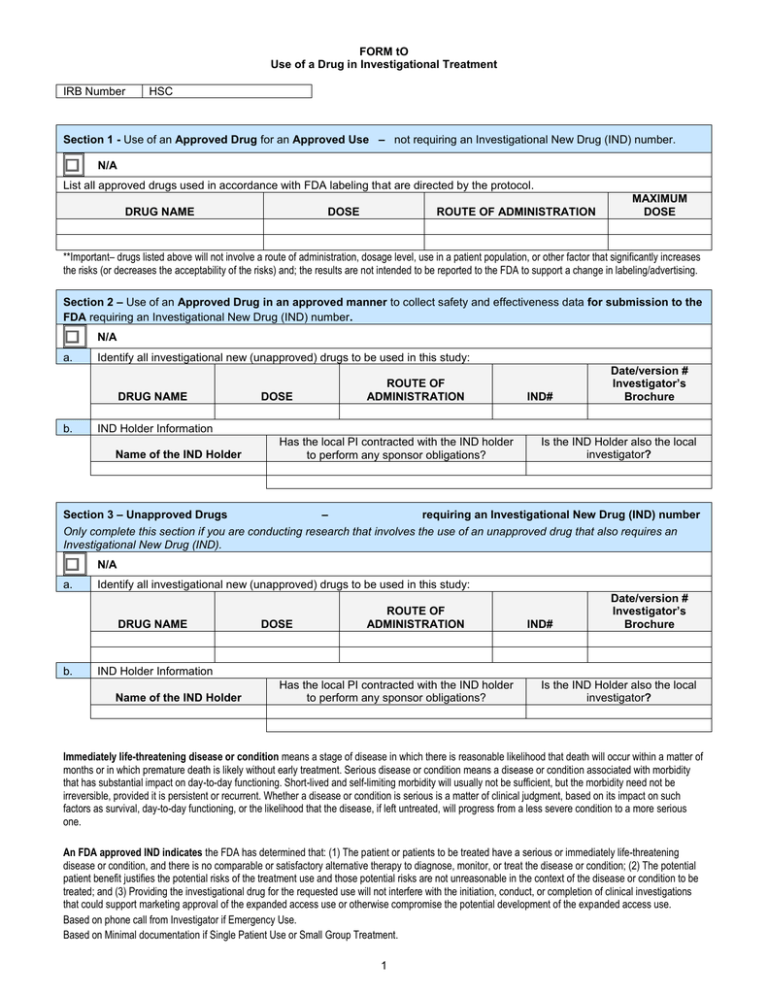
FORM tO Use of a Drug in Investigational Treatment IRB Number HSC Section 1 - Use of an Approved Drug for an Approved Use – not requiring an Investigational New Drug (IND) number. N/A List all approved drugs used in accordance with FDA labeling that are directed by the protocol. DRUG NAME DOSE ROUTE OF ADMINISTRATION MAXIMUM DOSE **Important– drugs listed above will not involve a route of administration, dosage level, use in a patient population, or other factor that significantly increases the risks (or decreases the acceptability of the risks) and; the results are not intended to be reported to the FDA to support a change in labeling/advertising. Section 2 – Use of an Approved Drug in an approved manner to collect safety and effectiveness data for submission to the FDA requiring an Investigational New Drug (IND) number. N/A a. Identify all investigational new (unapproved) drugs to be used in this study: DRUG NAME b. DOSE ROUTE OF ADMINISTRATION IND# Date/version # Investigator’s Brochure IND Holder Information Name of the IND Holder Has the local PI contracted with the IND holder to perform any sponsor obligations? Is the IND Holder also the local investigator? Section 3 – Unapproved Drugs – requiring an Investigational New Drug (IND) number Only complete this section if you are conducting research that involves the use of an unapproved drug that also requires an Investigational New Drug (IND). N/A a. Identify all investigational new (unapproved) drugs to be used in this study: DRUG NAME b. DOSE ROUTE OF ADMINISTRATION IND# Date/version # Investigator’s Brochure IND Holder Information Name of the IND Holder Has the local PI contracted with the IND holder to perform any sponsor obligations? Is the IND Holder also the local investigator? Immediately life-threatening disease or condition means a stage of disease in which there is reasonable likelihood that death will occur within a matter of months or in which premature death is likely without early treatment. Serious disease or condition means a disease or condition associated with morbidity that has substantial impact on day-to-day functioning. Short-lived and self-limiting morbidity will usually not be sufficient, but the morbidity need not be irreversible, provided it is persistent or recurrent. Whether a disease or condition is serious is a matter of clinical judgment, based on its impact on such factors as survival, day-to-day functioning, or the likelihood that the disease, if left untreated, will progress from a less severe condition to a more serious one. An FDA approved IND indicates the FDA has determined that: (1) The patient or patients to be treated have a serious or immediately life-threatening disease or condition, and there is no comparable or satisfactory alternative therapy to diagnose, monitor, or treat the disease or condition; (2) The potential patient benefit justifies the potential risks of the treatment use and those potential risks are not unreasonable in the context of the disease or condition to be treated; and (3) Providing the investigational drug for the requested use will not interfere with the initiation, conduct, or completion of clinical investigations that could support marketing approval of the expanded access use or otherwise compromise the potential development of the expanded access use. Based on phone call from Investigator if Emergency Use. Based on Minimal documentation if Single Patient Use or Small Group Treatment. 1 FORM tO Use of a Drug in Investigational Treatment IRB Number HSC Based on full protocol if Treatment Protocol under Treatment IND. Section 4 – A radioactive drug (e.g., 3H and 14C labeled drug, biologic or amine) that has not been approved by the FDA will be used to obtain basic information regarding either: the metabolism of a radioactively labeled drug, OR human physiology, pathophysiology, or biochemistry, AND the drug is not intended for immediate therapeutic, diagnostic, or similar purposes or to determine the safety and effectiveness of the drug in humans. (such use would require a IND submission) N/A List all drugs being used in this manner below DRUG NAME DOSE / ROUTE RDRC # INTENDED USE Note: Research involving Cold Isotopes (nonradioactive, stable isotopes such as deuterium (2H) and 13-Carbon) is not conducted under 21 CFR 361.1 (RDRC). § 361.1 does not apply to nonradioactive drugs [Guidance for Industry and Researchers The Radioactive Drug Research Committee: Human Research Without An Investigational New Drug Application] Human research use of such nonradioactive stable isotopes such as deuterium and 12-Carbon as tracers used to label drugs, biologics, amines, or organic molecules such as a carbohydrates, lipids, nucleic acids, peptides, small proteins, or antibodies, etc., is regulated under 21 CFR 312 and must be conducted under an IND or must be exempt from submission to the FDA for an IND (See Form O). 2
